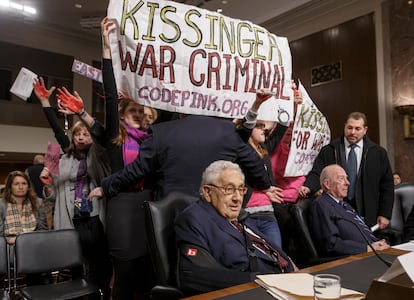Kissinger’s dirty hands
The late American statesman wielded a blend of cunning and ruthlessness to influence global politics

Henry Kissinger, who died on November 30 at the remarkable age of 100, undeniably left an indelible mark on recent world history through his ideas, diplomatic prowess and political acumen. He stands as a shining example of an intellectual who wholeheartedly embraced the role of statesman during a critical juncture for his nation. Serving as Secretary of State and National Security Advisor during an eight-year tenure in the White House, Kissinger played a pivotal role in bringing an end to the Vietnam War, initiating a policy of détente with the USSR, and ushering in an era of globalization by forging ties with an isolationist China led by Mao Zedong.
While the Watergate scandal slowly encircled President Nixon, Kissinger negotiated for a ceasefire in the Yom Kippur War and Israel’s withdrawal from the Sinai Peninsula. The resulting armistice influenced the map of the Middle East that emerged (and remains today) after the Camp David Accords between Egyptian President Anwar Sadat and Israeli Prime Minister Menachem Begin.
In the ever-evolving international landscape, Henry Kissinger’s impact is profound and contentious. While universally acknowledged for his experience, wisdom, and intellect, the late statesman is also associated with the moral ambiguity, cynicism and impunity of his involvement in prolonging the Vietnam War and the indiscriminate U.S. bombing campaign in Cambodia. Kissinger was also complicit in Washington’s inaction during Pakistan’s genocidal war in Bangladesh and support of military coups in Chile and other Latin American countries, episodes that have severely tarnished his legacy. In 1973, Kissinger was a key player in Augusto Pinochet’s violent overthrow of Salvador Allende’s democratic government in Chile. But three months later, Kissinger was awarded the Nobel Peace Prize for his work in negotiating a ceasefire in the Vietnam War, leading several members of the Nobel Committee to resign in protest.
Recognized as one of the most exceptional strategists of the 20th century, Kissinger left government in the mid-1970s and leveraged his skills, contacts and reputation in a prosperous political consulting business that attracted clients with a wide range of ideologies. When George W. Bush appointed him chair of the 9/11 Commission in November 2022, Kissinger resigned a month later to address concerns about potential conflicts of interest related to his affiliations with various governments and political figures.
The ambiguity of his legacy as a pragmatist thinker who deftly manipulated the international balance of power was not lost on anyone. As news of his death spread, Kissinger garnered praise and admiration from staunch U.S. adversaries and autocrats like Vladimir Putin and Xi Jinping. However, such accolades offer little solace to the countless unnamed victims of his cunning and ruthless policies.
Sign up for our weekly newsletter to get more English-language news coverage from EL PAÍS USA Edition
Tu suscripción se está usando en otro dispositivo
¿Quieres añadir otro usuario a tu suscripción?
Si continúas leyendo en este dispositivo, no se podrá leer en el otro.
FlechaTu suscripción se está usando en otro dispositivo y solo puedes acceder a EL PAÍS desde un dispositivo a la vez.
Si quieres compartir tu cuenta, cambia tu suscripción a la modalidad Premium, así podrás añadir otro usuario. Cada uno accederá con su propia cuenta de email, lo que os permitirá personalizar vuestra experiencia en EL PAÍS.
¿Tienes una suscripción de empresa? Accede aquí para contratar más cuentas.
En el caso de no saber quién está usando tu cuenta, te recomendamos cambiar tu contraseña aquí.
Si decides continuar compartiendo tu cuenta, este mensaje se mostrará en tu dispositivo y en el de la otra persona que está usando tu cuenta de forma indefinida, afectando a tu experiencia de lectura. Puedes consultar aquí los términos y condiciones de la suscripción digital.









































